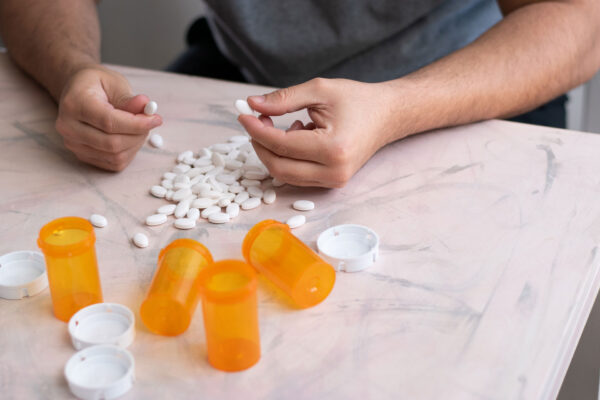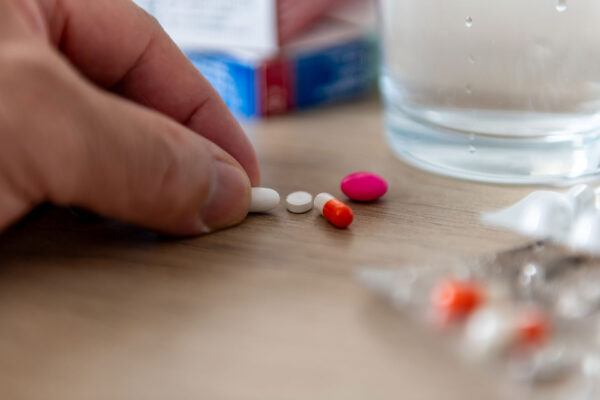Prescription Drug Addiction Treatment in Southern California
Have you ever found yourself trapped in the cycle of prescription drug addiction, wondering how things got this far? You’re not alone. Prescription drug addiction has quietly become a growing concern, affecting not just individuals but entire families across the nation. The path to addiction can be unexpected, and the weight it places on your life is often overwhelming. But there is hope—there is a way forward.
Challenges of Prescription Drug Addiction
What is Prescription Drug Addiction Treatment?

At Altitude Recovery, we understand the unique challenges of prescription drug addiction. It’s not just about breaking free from the physical hold but also healing the emotional and mental toll it has taken on you. Our prescription drug addiction treatment center in Southern California offers more than just a program; we offer a safe space, compassionate care, and a tailored approach to help you regain control of your life. We believe in your ability to overcome this, and we’re here to guide you through every step of this challenging but transformative journey.
Reaching out for help is not a sign of weakness—it’s the first step towards reclaiming your life. Let our experienced team support you as you break free from the grip of prescription drug addiction and discover a future filled with hope, health, and renewed purpose. Healing is possible, and it starts with taking that first brave step. We’re here to walk it with you.
Understanding Prescription Drug Addiction

Addictive prescription drugs are medications that, despite their therapeutic benefits, carry a high potential for abuse and dependency. These substances can negatively impact an individual’s physical and mental health when misused. Below are some common types of addictive prescription drugs and their associated risks:
Opioids
- Examples. Oxycodone (OxyContin), Hydrocodone (Vicodin), Morphine, Codeine
- Overview. Opioids are commonly prescribed for pain relief. They work by binding to opioid receptors in the brain and spinal cord, reducing the perception of pain. While effective for short-term pain management, the euphoric feeling they induce can lead to misuse and addiction.
- Fact. According to the National Institute on Drug Abuse (NIDA), over 2 million people in the United States suffer from substance use disorders related to prescription opioid pain relievers.
Benzodiazepines
- Examples. Alprazolam (Xanax), Diazepam (Valium), Lorazepam (Ativan), Clonazepam (Klonopin)
- Overview. Benzodiazepines are prescribed to treat anxiety, panic disorders, and insomnia. They enhance the effect of the neurotransmitter GABA, which has a calming effect on the brain. However, regular use can lead to tolerance, requiring higher doses to achieve the same effect, increasing the risk of addiction.
- Fact. Chronic use of benzodiazepines can lead to physical dependence and withdrawal symptoms similar to those seen with alcohol withdrawal.
Stimulants
- Examples. Amphetamine (Adderall), Methylphenidate (Ritalin), Dexmethylphenidate (Focalin)
- Overview. Stimulants are often prescribed for attention deficit hyperactivity disorder (ADHD) and certain sleep disorders like narcolepsy. They increase the levels of certain neurotransmitters in the brain, improving focus, attention, and alertness. However, their stimulating effects can lead to misuse, particularly in high-stress environments such as schools and workplaces.
- Fact. NIDA reports that the misuse of prescription stimulants has been rising, especially among young adults, escalating concerns about their potential for addiction.
Other Commonly Misused Prescription Drugs
- Sleep Medications. Zolpidem (Ambien) and Eszopiclone (Lunesta) are prescribed to treat insomnia but can also be addictive when used beyond prescribed limits.
- Barbiturates. Phenobarbital and Secobarbital (Seconal) were once commonly prescribed for anxiety and sleep disorders but are less common now due to their high potential for dependence and overdose.
Signs and Symptoms
Recognizing addiction can be challenging. Here are some signs and symptoms of prescription drug addiction:
- Increased Tolerance. Over time, the person requires higher doses of the medication to achieve the same effect. This happens because their body becomes accustomed to the drug, leading to decreased effectiveness at the original dosage.
- Withdrawal Symptoms. When the person stops taking the drug or reduces the dose, they experience physical and mental symptoms such as anxiety, irritability, nausea, sweating, shaking, and depression. These symptoms are indicative of physical dependence on the drug.
- Compulsive Use. The person feels an uncontrollable urge to take the drug, often at inappropriate times or in higher quantities than prescribed. This behavior is driven by the brain’s reward system being hijacked by the substance.
- Doctor Shopping. To obtain multiple prescriptions, the person visits different doctors without informing them of existing prescriptions. This deceitful behavior aims to secure more of the drug than would be possible through legitimate channels.
- Neglecting Responsibilities. The person may neglect work, school, or family obligations. Their focus shifts toward obtaining and using the drug, often at the expense of other important areas of life.
- Social Withdrawal. The individual starts isolating themselves from friends and family. This can occur either to hide their drug use or because their sole focus becomes obtaining and consuming the drug.
- Financial Problems. The cost of maintaining the addiction can lead to financial difficulties. The person might spend excessive amounts of money on the drug, sometimes resorting to borrowing or stealing.
- Erratic Behavior. Mood swings, irritability, aggression, or uncharacteristic behavior can happen. These changes are usually a result of the drug’s impact on the brain’s chemistry and the person’s emotional state when not using the drug.
- Changes in Appearance. The person may show signs of neglecting personal hygiene, sudden weight loss or gain, and a general decline in physical appearance. These changes sometimes reflect the individual’s altered priorities and potential health deterioration.
- Loss of Interest in Hobbies and Activities. Activities and hobbies that were once enjoyed are abandoned as the addiction deepens. The person loses interest in anything that doesn’t involve the drug, narrowing their focus to solely obtaining and using it.
Our Addiction Treatment Services in South California
At Altitude Recovery Community, we offer a comprehensive dual diagnosis treatment services that begins with understanding your unique needs.
Detoxification
Detoxification is often the first step in the addiction treatment process. Our prescription drug detox services are designed to safely manage withdrawal symptoms under the supervision of our experienced medical staff. This phase lays the foundation for long-term recovery by eliminating the physical dependence on the addictive substances.
Residential Inpatient
Following detox, our residential treatment program offers a secure and supportive environment where individuals can focus solely on their recovery from prescription drug addiction. Our comprehensive treatment plans include various levels of care tailored to each person's unique needs.
Aftercare Planning
The road to recovery is an ongoing process, and our aftercare planning makes sure you're not alone once you leave the residential program. We provide extended care options like family therapy that offer stability and continued support as you go through your everyday life free from addiction.
Our Treatment Programs

- Cognitive-behavioral therapy (CBT). CBT is one of the most effective treatments for substance abuse. It helps you understand the thoughts and emotions contributing to your addiction and equips you with coping mechanisms for sustained recovery.
- Dialectical Behavior Therapy (DBT). DBT is particularly helpful for those with co-occurring mental health disorders like anxiety or bipolar disorder. This therapy focuses on emotional regulation, distress tolerance, and interpersonal effectiveness.
- Acceptance Commitment Therapy (ACT). ACT encourages individuals to accept their thoughts and feelings rather than fighting them. This approach can help ease the mental health challenges often associated with addiction.
- Reiki Therapy. Our holistic therapies, including Reiki, aim to balance the body’s energy fields and promote mental and physical well-being. Reiki sessions can also reduce stress, a common trigger for relapse.
- Yoga Therapy. Yoga therapy integrates physical postures, breathing exercises, and meditation to improve physical health and reduce anxiety, aiding in a more comprehensive recovery process.
- Art Therapy. Art therapy facilitates self-expression and can be a therapeutic outlet for individuals dealing with the emotional aspects of prescription drug abuse.
- Group Therapy. Group therapy sessions provide a supportive environment where individuals can share experiences, learn from others, and build a community of mutual support.
Why Choose Us for prescription drug addiction treatment in Souther California?
Comprehensive Treatment Plans
We provide a complete range of services, including medically supervised detox, intensive residential rehab, and detailed aftercare planning. Our goal is to support you at every step, from the start of your recovery journey to maintaining long-term sobriety.
Expert Team
Our team consists of licensed therapists and certified addiction specialists. Together, they collaborate to deliver high-quality, personalized care that addresses both the physical and emotional aspects of addiction.
Family Involvement
Knowing that recovery is a family journey, we offer programs designed to educate and involve your loved ones. Our family programs help strengthen relationships and create a supportive home environment by fostering communication and support.
Continuum of Care
We offer a continuum of care that adapts to your needs as you progress through recovery. Whether you start with residential rehab or transition to outpatient care, we make sure you have the necessary support to prevent relapse and maintain your progress.
Individualized Approach
Clients receive a personalized treatment plan tailored to their unique challenges and goals. Our thorough assessments allow us to address their specific needs, ensuring that their recovery path is as effective as possible.
Holistic Therapies
We incorporate holistic therapies such as yoga and Reiki to enhance your recovery experience. These therapies promote overall well-being, helping you achieve balance in both mind and body.
Overcome Prescription Drug Addiction: Reach Out to Altitude Recovery!
At Altitude Recovery, your healing and freedom from prescription medication addiction are our top priorities. If you or someone you care about is struggling, know there is hope—and you don’t have to face this alone. The first step toward reclaiming your life is often the hardest and most courageous.
Our team is here to walk with you through every stage of recovery, offering the support, care, and understanding you need. We blend evidence-based therapies with a holistic approach to address not just the physical aspects of addiction but also the emotional and mental ones. At Altitude Recovery, we believe in treating the whole person, not just the addiction.
Your journey to a healthier, more fulfilling life starts when you reach out. Let us provide the compassionate care and guidance you deserve as we work together toward lasting recovery. Your brighter, drug-free future is waiting—you’re just one step away.

